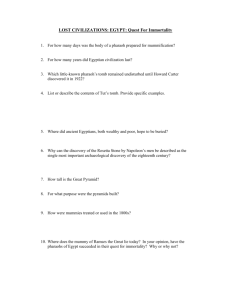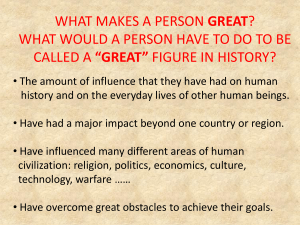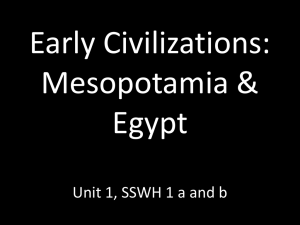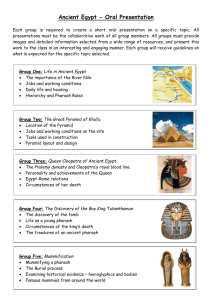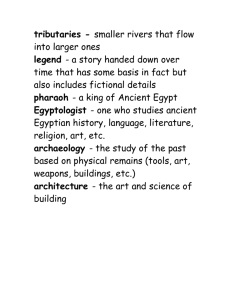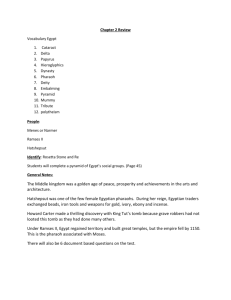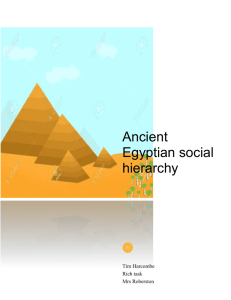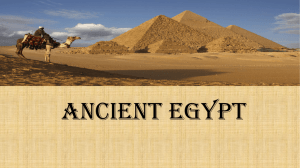10 Questions for Watson's Human
advertisement
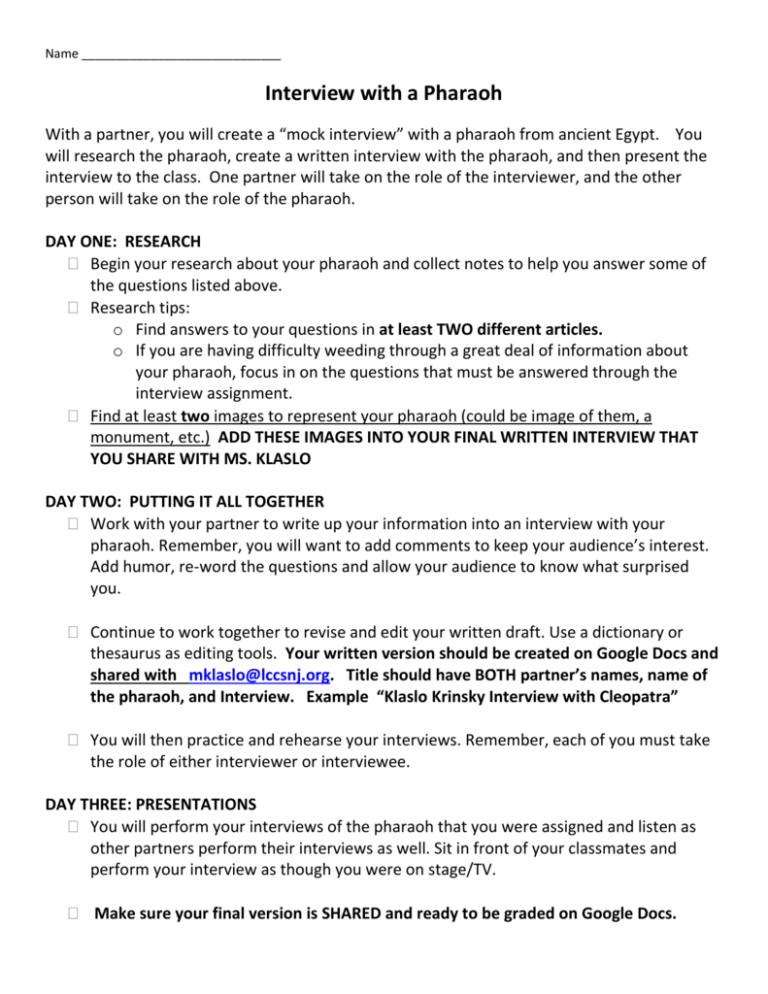
Name _____________________________ Interview with a Pharaoh With a partner, you will create a “mock interview” with a pharaoh from ancient Egypt. You will research the pharaoh, create a written interview with the pharaoh, and then present the interview to the class. One partner will take on the role of the interviewer, and the other person will take on the role of the pharaoh. DAY ONE: RESEARCH Begin your research about your pharaoh and collect notes to help you answer some of the questions listed above. Research tips: o Find answers to your questions in at least TWO different articles. o If you are having difficulty weeding through a great deal of information about your pharaoh, focus in on the questions that must be answered through the interview assignment. Find at least two images to represent your pharaoh (could be image of them, a monument, etc.) ADD THESE IMAGES INTO YOUR FINAL WRITTEN INTERVIEW THAT YOU SHARE WITH MS. KLASLO DAY TWO: PUTTING IT ALL TOGETHER Work with your partner to write up your information into an interview with your pharaoh. Remember, you will want to add comments to keep your audience’s interest. Add humor, re-word the questions and allow your audience to know what surprised you. Continue to work together to revise and edit your written draft. Use a dictionary or thesaurus as editing tools. Your written version should be created on Google Docs and shared with mklaslo@lccsnj.org. Title should have BOTH partner’s names, name of the pharaoh, and Interview. Example “Klaslo Krinsky Interview with Cleopatra” You will then practice and rehearse your interviews. Remember, each of you must take the role of either interviewer or interviewee. DAY THREE: PRESENTATIONS You will perform your interviews of the pharaoh that you were assigned and listen as other partners perform their interviews as well. Sit in front of your classmates and perform your interview as though you were on stage/TV. Make sure your final version is SHARED and ready to be graded on Google Docs. 10 Questions for Watson's Human Author(s)’ Names Why aren't you letting Watson speak for himself today? Watson is trained to answer questions for Jeopardy! It's not an interactive dialogue system, so it can't conduct its own interviews. You can imagine giving it information so it could answer [impromptu] questions, but it would still be responding only from content it's been given and analyzed. What about aspirational questions? Could Watson respond if it was asked, "What do you want to be doing in five years?" It would have to be given some information about itself as an entity in the world in order to do that. But that's not IBM's focus. Watson is designed to deeply analyze existing content and help people make decisions, not to be an independent entity. People have said that Watson functions at the level of a precocious child. Do you agree? When an artificial-intelligence system can perform a particular task, we have to be careful not to look beyond that task. Take Deep Blue, the [IBM] system that beat a grand-champion chess master. Few adults are smart enough to do that. But Deep Blue wasn't a system that could go off and even approach a child's ability to do language, to move, to think, to interact. And yet Watson does understand natural language. But only in a way that we call statistical machine learning. It gives you the answer that makes sense to you, but it doesn't mean anything to the computer. Do you worry that Watson could be misused--to game the stock market, say? A chair can be misused, so it's hard to answer that in the abstract. Watson's not being put in control of anything. It's not being hooked up to an environment where it's independently making decisions. This just strikes me as the least thing to worry about here. (See the top 10 man vs. machine moments.) IBM talks about Watson's being used to diagnose diseases. Can a machine make intuitive leaps like the ones Dr. House makes on the TV show? That's a tough question, because I wonder what intuition really is. It's probably a process like connecting the logical dots, but we call it intuition simply because we're not fully conscious of the process. If I tell Watson a joke, will it get it? Could it tell me one? One of the things we programmed it to do was recognize what humans would consider puns. It looks for word associations, for synonymy, for "sounds like." But does the computer appreciate the humor? No, it doesn't. So no chance Watson could be an artist or poet either? Actually, it could be programmed to have those features. You could train Watson to recognize modern art or classical art, symmetry, shape and color. You could tell it, This is good art, this is bad art. But again, that's all. Will Watson or its kin ever come to work in our homes? There's definite potential there. With speech recognition, you could talk to your TV, to your mobile devices, to your computer without having to type in a bunch of commands. I like to think about Star Trek, about a computer you could talk to while you're walking around. Questions for the Pharaoh: Directions: Research the answers for the following questions. There are TWO bullet points because you should get answers from TWO different places to make sure the information is correct. Name of your Pharaoh: __________________________ 1. When were you born? 2. When did you die? 3. Who were you married to? 4. Did you have any children? Who were they? 5. Were you a part of a dynasty of rulers? If so, which dynasty? 6. Who was the pharaoh before you? Who was the pharaoh after you ? 7. Where (which city or part of Egypt) did you rule from? 8. What were you like as a leader? Were you cruel? Kind? How did you treat your people? 9. What did Egypt accomplish under your rule? 10.Were any significant structures (statues, temples, pyramids, or other buildings or monuments) built in your reign or built for you? 11.Did you have a tomb? 12.Has your tomb been discovered yet? 13.What did you take to the afterlife with you? What was buried in your tomb? 14.Tell me three other things about you. 15.Did you go to war with another group of people? 16.Did you have any interesting religious beliefs?
